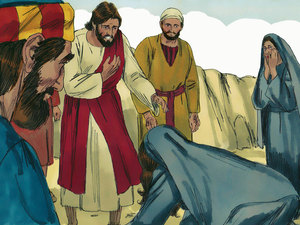

Early chroniclers may simply have wanted to minimize Lazarus’ presence in the gospel accounts to protect him and his sisters earlier in the first century. The raising of Lazarus had an impact on the Jewish opposition that was unique amongst those who had been raised by Jesus. As a result, the chief priests and Pharisees convened a council and “from that day on they planned together to kill ” (John 11:53). Jesus performed the miracle in the presence of these Jewish witnesses and “many of the Jews who came to Mary, and saw what He had done, believed in Him” (John 11:45). Martha even went out to meet Jesus prior to his arrival, seemingly aware of the disciple’s concern that “these Jews were just now seeking to stone ” (John 11:8). When Jesus arrived at the tomb of Lazarus, “many of the Jews had come to Martha and Mary, to console them concerning their brother” (John 11:18). There may be a good reason Mark, Matthew and Luke failed to mention Lazarus’ resurrection, even though they described similar miracles. There is good reason to believe Jesus raised even more people from the dead, given John’s clear statement, “There are many other things that Jesus did if all were written down, the world itself, I suppose, would not hold all the books that would have to be written” (John 21: 25). John doesn’t mention either of these miracles and Mathew and Mark fail to mention the widow’s son. Jesus also brought Jairus’ daughter back to life (Matthew 9:23-26, Mark 5:35-43, and Luke 8:40-56), as well as the son of the widow of Nain (Luke 7:12-15). Lazarus wasn’t the only person Jesus raised from the dead. Jesus raised someone from the dead, for crying out loud! How could the other gospel writers forget about that? This objection rests, however, on the presumption that a miracle of this nature was extravagant or exceedingly unusual in the ministry of Jesus, and I think this presumption is false. Part of my suspicion rested in the extravagant nature of the miracle itself.

While the absence of this miracle in the synoptic gospels initially seemed to pose a problem, the more I investigated it, the smaller the problem became. Why Is It Missing from The Other Accounts? Why is John the only person to mention something this dramatic and allegedly well-known? Doesn’t the absence of Lazarus’ story from all the other accounts cast doubt on its authenticity? The biggest problem for me was its absence from the other gospel accounts. Spong believes the Gospel writer (someone other than the apostle John, by the way) exaggerated the fictional narrative “to counter any attempt to read it literally.” Spong argues the author intentionally exaggerated the story so the reader would recognize it’s fictional status (“Jesus does not just raise a person from the dead, he raises one who has been dead and even buried for four days, one who is still bound in grave clothes and one who, according to the King James translation ‘already stinketh’ with the odor of decaying flesh!”) Like Spong, I also resisted the idea that Jesus performed this miracle, although for a different reason. It brought back memories of my old atheistic resistance to this story and reminded me of John Shelby Spong’s comment a few years back challenging the historicity of this event. One Sunday in church, our pastor preached from John chapter 11, the Raising of Lazarus.


 0 kommentar(er)
0 kommentar(er)
